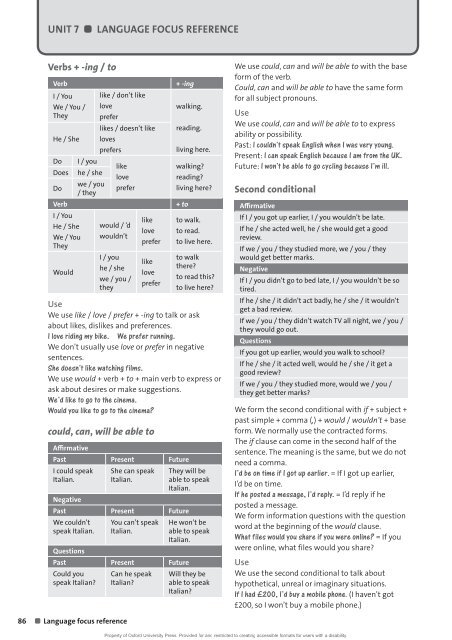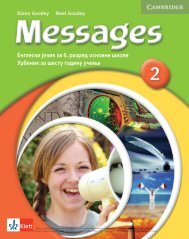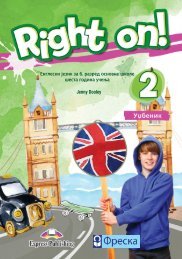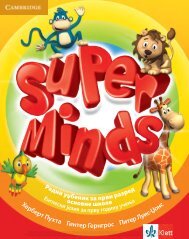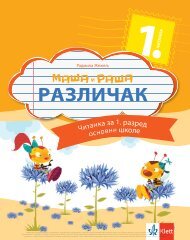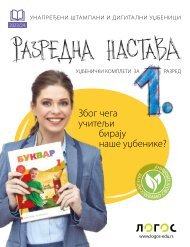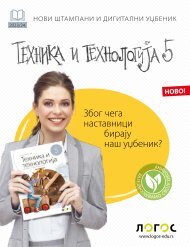Енглески језик 7, радна свеска, старо издање, Нови Логос
- No tags were found...
You also want an ePaper? Increase the reach of your titles
YUMPU automatically turns print PDFs into web optimized ePapers that Google loves.
UNIT 7<br />
LANGUAGE FOCUS REFERENCE<br />
Verbs + -ing / to<br />
Verb<br />
I / You like / don’t like<br />
We / You / love<br />
They<br />
prefer<br />
likes / doesn’t like<br />
He / She loves<br />
prefers<br />
Do I / you<br />
like<br />
Does he / she<br />
love<br />
we / you<br />
Do<br />
prefer<br />
/ they<br />
Verb<br />
I / You<br />
like<br />
He / She would / ’d<br />
love<br />
We / You wouldn’t<br />
prefer<br />
They<br />
I / you<br />
like<br />
he / she<br />
Would<br />
love<br />
we / you /<br />
prefer<br />
they<br />
+ -ing<br />
walking.<br />
reading.<br />
living here.<br />
walking?<br />
reading?<br />
living here?<br />
+ to<br />
to walk.<br />
to read.<br />
to live here.<br />
to walk<br />
there?<br />
to read this?<br />
to live here?<br />
Use<br />
We use like / love / prefer + -ing to talk or ask<br />
about likes, dislikes and preferences.<br />
I love riding my bike. We prefer running.<br />
We don’t usually use love or prefer in negative<br />
sentences.<br />
She doesn’t like watching films.<br />
We use would + verb + to + main verb to express or<br />
ask about desires or make suggestions.<br />
We’d like to go to the cinema.<br />
Would you like to go to the cinema?<br />
could, can, will be able to<br />
Affirmative<br />
Past Present Future<br />
I could speak<br />
Italian.<br />
She can speak<br />
Italian.<br />
They will be<br />
able to speak<br />
Italian.<br />
Negative<br />
Past Present Future<br />
We couldn’t<br />
speak Italian.<br />
You can’t speak<br />
Italian.<br />
He won’t be<br />
able to speak<br />
Italian.<br />
Questions<br />
Past Present Future<br />
Could you<br />
speak Italian?<br />
Can he speak<br />
Italian?<br />
Will they be<br />
able to speak<br />
Italian?<br />
We use could, can and will be able to with the base<br />
form of the verb.<br />
Could, can and will be able to have the same form<br />
for all subject pronouns.<br />
Use<br />
We use could, can and will be able to to express<br />
ability or possibility.<br />
Past: I couldn’t speak English when I was very young.<br />
Present: I can speak English because I am from the UK.<br />
Future: I won’t be able to go cycling because I’m ill.<br />
Second conditional<br />
Affirmative<br />
If I / you got up earlier, I / you wouldn’t be late.<br />
If he / she acted well, he / she would get a good<br />
review.<br />
If we / you / they studied more, we / you / they<br />
would get better marks.<br />
Negative<br />
If I / you didn’t go to bed late, I / you wouldn’t be so<br />
tired.<br />
If he / she / it didn’t act badly, he / she / it wouldn’t<br />
get a bad review.<br />
If we / you / they didn’t watch TV all night, we / you /<br />
they would go out.<br />
Questions<br />
If you got up earlier, would you walk to school?<br />
If he / she / it acted well, would he / she / it get a<br />
good review?<br />
If we / you / they studied more, would we / you /<br />
they get better marks?<br />
We form the second conditional with if + subject +<br />
past simple + comma (,) + would / wouldn’t + base<br />
form. We normally use the contracted forms.<br />
The if clause can come in the second half of the<br />
sentence. The meaning is the same, but we do not<br />
need a comma.<br />
I’d be on time if I got up earlier. = If I got up earlier,<br />
I’d be on time.<br />
If he posted a message, I’d reply. = I’d reply if he<br />
posted a message.<br />
We form information questions with the question<br />
word at the beginning of the would clause.<br />
What files would you share if you were online? = If you<br />
were online, what files would you share?<br />
Use<br />
We use the second conditional to talk about<br />
hypothetical, unreal or imaginary situations.<br />
. (I haven’t got<br />
£200, so I won’t buy a mobile phone.)<br />
86 Language focus reference<br />
Property of Oxford University Press. Provided for and restricted to creating accessible formats for users with a disability.


